Iranian MP Claims Disqualification Stemmed From Criticism Of Russia
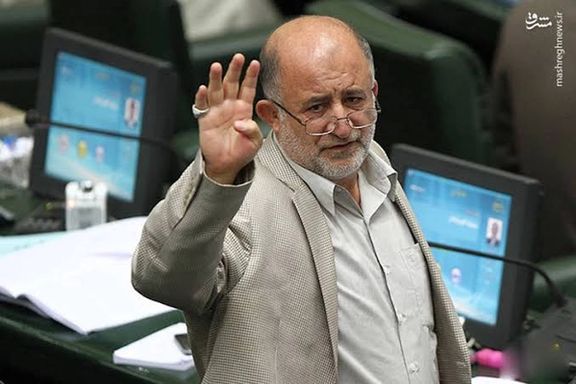
A former Iranian parliamentarian has claimed his disqualification for the upcoming March elections was a consequence of his outspoken criticism of Russia's policies.

A former Iranian parliamentarian has claimed his disqualification for the upcoming March elections was a consequence of his outspoken criticism of Russia's policies.
Nader Ghazipour, among the former members of parliament whose qualifications were not approved by the Guardian Council for the impending elections, said, "I was the only representative who spoke publicly in the parliament against Russia and said that Russia is after our waters, [a] divided Azerbaijan, [has] imposed shameful treaties of Golestan and Turkmenchay on us, and didn’t sell even one barrel of Iranian oil during sanctions and took its money several times."
Iran's clerical watchdog, the Guardian Council, has invalidated the qualifications of approximately one in every ten current lawmakers aspiring to run in the March parliamentary elections.
The mass disqualification of candidates, particularly those perceived as regime insiders with relatively moderate tendencies, echoes previous instances such as the 2020 legislative elections and the 2021 presidential vote.
Ghazipour’s comments come as in 2016 he stirred controversy by asserting that women should not be permitted to serve in parliament, stating, "We didn't easily win control over the country to send every fox, kid, and donkey there. The parliament is not a place for donkeys."
Ghazipour has served on the parliament's Mine and Industry Commission and reportedly fought during the 1980-88 war with Iraq. He worked as Khamenei's campaign manager in 1981 and 1985, according to the website of the parliament's research center.
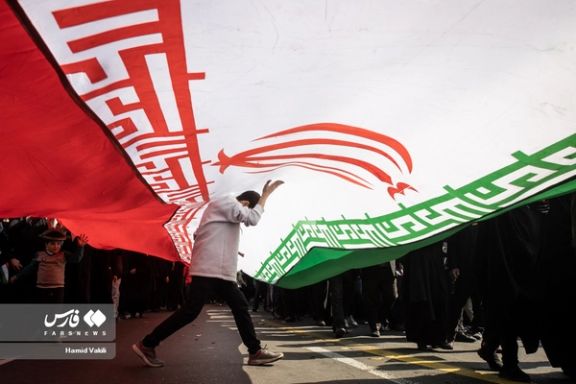
A tough-worded message on Sunday by the Office of US Special Envoy for Iran on the 45th anniversary of the Islamic Republic signaled a change of tone towards Tehran.
Deputy US Special Envoy for Iran Abram Paley released a video message stating that “the Islamic Republic has brought only violence and corruption at home and abroad.”
“Forty-five years ago today, the revolution in Iran led to the establishment of a regime based on fear, violence and oppression,” Paley said, as the Islamic Republic holds nationwide government-organized rallies to celebrate the 45th year of its establishment. “Flagrant and human rights abuses against dissidents, journalist, artists and minorities persist on a daily basis, and only underline the regime’s weakness.”
Paley’s message has drawn thousands of online responses by Iranians, who point out that Washington’s appeasement of Tehran while it is engaged in abuses at home and destabilizing acts abroad has encouraged the regime to continue such behavior. A large number of activists as well as American Republican politicians say the Biden administration is “soft” on Iran, demanding more pressure and less compromise.
In an interview with Iran International in January, Paley himself said that “words are not enough” but no decisive action has been taken by the US to stop Iran. Washington regularly announces sanctions on Iranian officials and entities but overall enforcement is so lax that the Islamic Republic’s oil revenues have tripled since President Joe Biden assumed office.
The Biden administration seems to have framed its Iran policy around a wish to revive the abandoned 2015 nuclear deal or at least come to another (written or unwritten) agreement that would limit Iran’s nuclear program. It also agreed to release billions of dollars of Iran's revenues frozen in South Korea and Iraq under US sanctions as part of a prisoner swap deal, described by critics as the biggest ransom ever paid to a hostage taker. About $6 billion was freed up for Iran in September after Iran released five Iranian-Americans held in Tehran in exchange for five Iranians imprisoned in the US, and another $11 billion from Iraq.
Paley highlighted that instead of providing for its people's needs, the Iranian regime spends money “on expanding its nuclear program in ways that have no credible, peaceful purpose, fueling instability across the region, proliferating dangerous weapons to places like Russia and disrupting international commerce.”
Considering Iran’s supply of drones and missiles for the Russian invasion of Ukraine, it is no surprise that Moscow was among the first countries that congratulated Iran on the anniversary. In a video message, Russian Foreign Ministry Spokeswoman Maria Zakharova echoed a propaganda line reiterated by Iranian authorities, including Supreme Leader Ali Khamenei, saying that Russia and Iran are joining forces to establish a new global order.
Iranian President Ebrahim Raisi also delivered a speech for the occasion, which -- not-surprisingly – was again focused on Israel and the war in Gaza. Since Iran-backed Hamas attacked Israel, Tehran and its regional proxies have ramped up their operations against US targets. Iran-backed groups in Iraq and Syria have been striking US bases, Hezbollah in Lebanon has been launching missiles towards northern Israel, and Yemen's Houthis have been attacking commercial vessels in the Red Sea, all in allegiance with Hamas to pressure Israel into ceasing its offensive in Gaza. Hamas is part of Iran's "Axis of Resistance", a regional alliance that includes Lebanon's Hezbollah, the Syrian government of President Bashar al-Assad, Shiite militia groups in Iraq and the Houthis who control a large part of Yemen.
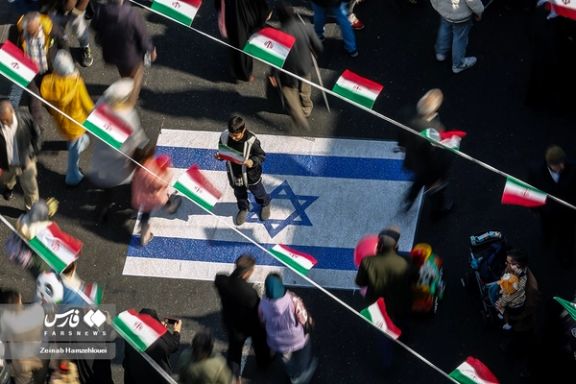
While thousands of people chanted "Death to Israel" and “Death to America” in rallies across Iran on Sunday, with some burning US and Israeli flags, President Raisi accused the United States and some Western countries of backing "the Zionist regime's (Israel) crimes against humanity in Gaza".
Paley, elsewhere in his message, claimed that “the Islamic republic has never been more isolated than it is today” because of its own choices. The statement was reflected in Raisi’s speech from a very different perspective as he claimed Iran is “the most independent country in the world, not depending on the West or the East”
Paley also acknowledged that “the people of Iran have demonstrated courage and resilience in the face of a system that sensors, arrests, tortures and execute them." Raisi said that “contrary to what proponents of free speech claim, real freedom exists in this country and system.”
Addressing Iranians, Paley said “the United States will continue to support you in your fight for a free and Democratic future.” “We will continue to provide tools to access the uncensored Internet that you need to advocate for your future, and we will continue to work with partners to counter the regime support for terrorism across the Middle East, which comes only at your expense.”
Many Iranians marked the 45th anniversary of the 1979 Revolution on the eve of regime-sponsored celebrations with cries of "Death to the Dictator" and “Death to the Islamic Republic,” ringing through neighborhoods in the capital Tehran.
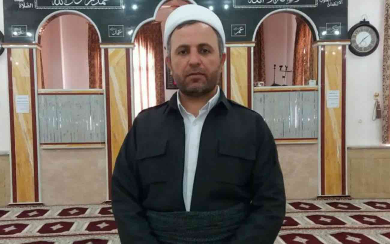
A revolutionary court in Urmia has sentenced Sunni Kurdish cleric Mohammad Khezrnejad to death on charges of "corruption on earth."
The 45-year-old cleric from Bukan in West Azarbaijan Province, also received a 15-year prison sentence on charges of "causing harm to the integrity or independence of the country," along with an additional one-year imprisonment on charges of "propaganda against the system."
Khezrnejad's most recent court session occurred in November via video conference, without the presence of a lawyer. Khezrnejad was arrested on November 19 after delivering a speech at a commemorative event for Asad Rahimi, a victim of the Women, Life, Freedom protests in Bukan.
Following his arrest, a coalition of religious scholars and Friday prayer leaders in Sanandaj and Dehgolan, in Kordestan province, demanded the immediate release of all protest detainees, including Khezrnejad. They cautioned the government against issuing death sentences for protesters.
With the inception of the Women, Life, Freedom protests, sparked by the death in morality-police custody of Mahsa Amini, Sunni clerics experienced heightened pressure, encountering threats, detentions, and the imposition and execution of security verdicts.
The US-based Human Rights Activists News Agency (HRANA) recently reported that Iranian courts handed down 35 death sentences in January, marking the highest number of such penalties issued within a single month in over a year. Additionally, 86 individuals were executed across the country during the same month.
Among them was Kurdish Sunni cleric Farhad Salimi, executed on January 23 after serving a 14-year prison term in Ghezelhesar prison in Karaj.
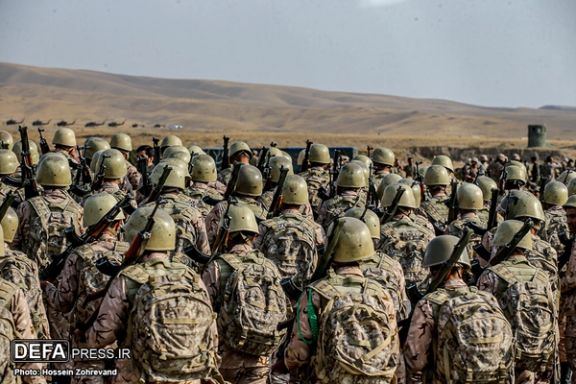
Two Basij militia members were killed in an armed assault on a guard post along the railway route from Zahedan to Bam in southeast Iran.
According to the Quds Headquarters of the Ground Forces of the Islamic Revolutionary Guard Corps, the two members were identified as Mohammad Anvar Gomshadzahi and Abdolhossein Baluch.
The incident follows a deadly assault in December perpetrated by the militant Sunni organization Jaish al-Adl, which targeted a police station in Rask, a small city in Iran’s Sistan-Baluchistan Province, resulting in the deaths of 12 police officers.
Sistan-Baluchistan Province, marked by poverty and bordering Afghanistan and Pakistan, hosts a substantial Sunni population from the Baluch ethnic group. The community faces pressure from Iran’s Shiite clerical rulers and experiences frequent clashes between security forces and Sunni militants, as well as drug smugglers.
Jaish al-Adl, purportedly advocating for greater rights and improved living conditions for ethnic minority Baluchis, frequently asserts responsibility for such attacks. Over recent years, the group has launched multiple assaults on Iranian security forces in the province.
In July, Jaish al-Adl targeted a police station in Zahedan, the provincial capital, alleging its involvement in the September 30, 2022, massacre of approximately 90 civilians, known as Black Friday. The ensuing anti-government protests following Friday prayers led to confrontations with security forces, resulting in demonstrations in Zahedan and the subsequent arrest of hundreds by security forces.
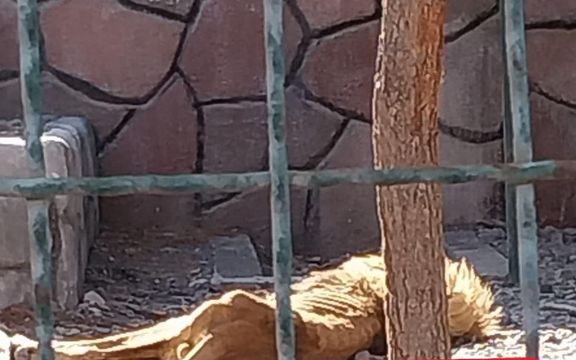
Recent images on social media have shed light on the alarming condition of a lion housed in the Mashhad Zoo.
An image depicts the emaciated and weak state of the animal, prompting concerns about its welfare.
According to the Khorasan Online channel, the lion displayed no signs of movement, leaving observers unable to determine if it was still alive.
The incident is not an isolated case of animal welfare negligence in Iranian zoos. In May 2021, Safadasht Zoo in Karaj faced scrutiny after one of the three African zebras it acquired from the Netherlands died shortly after arrival. The zoo attributed the zebra's death to mismanagement during customs procedures, leading to stress and internal infection.
In 2018, 10 zebras perished during a transfer operation, and in 2011, 14 lions suffering from glanders were killed.
Experts argue that the root cause of such issues lies in the prioritization of economic interests over conservation efforts. The lack of specialized training and education for animal importers and zoo owners further exacerbates the problem.

Many Iranians marked the 45th anniversary of the 1979 Revolution Saturday night with cries of "Death to the Dictator" ringing through neighborhoods in the capital Tehran.
Video clips recorded on mobile phones show people chanting against the regime during official fireworks to commemorate 22 Bahman (11 February), the day the Pahlavi dynasty collapsed and gave way to what is now known as the Islamic Republic.
“The government celebrates, we mourn,” says Ramtin, a freshman at Tehran University who lives in east Tehran. “They know everybody hates the system. They know people are angry. And still they rub their celebration in our face –on TV, on billboards across the city, and now these fireworks. I’m not sure I would’ve chanted tonight if there were no fireworks.”
The gulf between the state and the majority of Iranians has never been wider. The society at large, and the younger generation, in particular, have ‘moved on’ from the Islamic Republic.
“The anniversary is as relevant to us as the Chinese new year, perhaps less,” says Saba, a 34-year old musician who’s turned to catering to earn a living. “No one cares, really. But when the thugs come to your neighborhood crying Allah-o Akbar, you fume and you cry your lungs out to shut them up.”
This seems to have been the pattern of protests Saturday night. There was no ‘call to action’, no online campaign even, to spur people to protest on the anniversary of the revolution. In most places, so far as it can be gathered from posts on social media, the protests have been spontaneous reactions to the regime’s propaganda.
“It is depressing, in a way,” Saba explains, “to stand by the window in your room and cry Death to the Islamic Republic. It does nothing to the Islamic Republic. We just show them we hate them. But even that they know already. Or you can say we remind ourselves that we’re still there. And we’re the many. Yeah, that’s the most important thing, I think.”
Ironically, the ‘home-chanting’ is a legacy of the 1979 Revolution. During martial law and at times of curfew, those who didn’t want to risk going out would chant against the Shah (Mohammad Reza Pahlavi) from their rooftops.
“They were mad,” Ramtin says jokingly. “My uncle was roughly my age in 1979. He was very active at university. After the revolution, he wasn’t allowed back in the university. He fled before I was born, during the war [with Iraq], first to Germany and then to the US. He’s living his best life now and people like me have to suffer the consequences of his madness after 45 years.”
The younger generation of Iranians see the Islamic Republic and its ideology as an obstacle to the life they want to live. Their opposition to the regime is more personal than political.
“When I cry Death to the Islamic Republic, it’s a political slogan. It’s an expression of rage,” Saba says, “but when my younger cousin says it, it’s a literal wish. And it sounds less desperate, as if she’s confident that it will happen.”
Saba lives with two roommates in a one-bed apartment in west Tehran. Her parents live in Ekbatan, a huge residential complex and a hotbed of activism during the 2022 protests.
“Ekbatan was really loud again tonight,” Saba says. “My mom called me and held her mobile outside the window so that I could hear the slogans. She’s too cautious, too afraid maybe, to protest, but she’s become extremely political since the Women Life Freedom movement, and because of all that she has witnessed in Ekbatan last year.”
Dozens were arrested in Ekbatan during the protests in 2022 after a Basiji militia was killed in the area. The case is still ongoing with at least four young men charged with murder.
“I know one of the Ekbatan boys,” Saba says, referring to those arrested more than a year ago. “I’m really worried that he or others may get long sentences or even be executed. Their innocence cannot save them, just as it didn’t those who’ve been hanged in the last year or so. It’s not for no good reason that we say Death to the Islamic Republic.